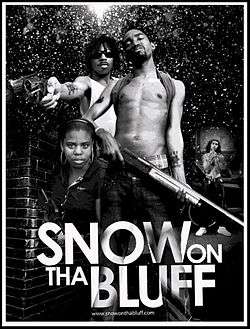Hood film
Hood film is a film genre originating in the United States, which features aspects of urban African-American or Hispanic-American culture such as hip hop music, street gangs, maras, racial discrimination, broken families, drug use and trafficking, illegal immigration into the United States and the problems of young men coming of age or struggling amid the relative poverty and violent gang activity within such neighborhoods.
Criteria
Critic Murray Forman notes that the "spatial logic" of hip-hop culture, with heavy emphasis on place-based identity, locates "black youth urban experience within an environment of continual proximate danger", and this quality defines the hood film.[1] In a 1992 essay in Cineaction, Canadian critic Rinaldo Walcott identified the hood film's primary concerns as issues of masculinity and "(re)gaining manhood for black men".[2]
Films that fit these criteria include Boyz n the Hood and Menace II Society. Among the directors who have made films in this genre are John Singleton, Mario Van Peebles, F. Gary Gray, Hughes Brothers, and Spike Lee. The genre has also been parodied with such films as Don't Be a Menace to South Central While Drinking Your Juice in the Hood. The genre reached the height of its popularity in the 90's due to the acclaim of films Boyz n the Hood, Juice and Menace II Society. With the plethora of films both dramas and comedies, hood films of the 90's are in a sense neo-Blaxploitation films.
Non-American hood films
A Jamaican film of this genre has been made, such as Shottas. City of God is a Brazilian film depicting life in the favelas of Rio de Janeiro. British films of this genre have also been made, such as Bullet Boy, Kidulthood, Adulthood, and the parody Anuvahood. The French films La Haine, Ma 6-T va crack-er, Yamakasi, and Banlieue 13 are also examples of this genre.
List of hood films
1970s
- Cooley High, 1975
- Cornbread, Earl and Me, 1975
- The Warriors, 1979
- Boulevard Nights, 1979
1980s
- Babylon, 1980
- Bad Boys, 1983
- Good to Go, 1986
- Colors, 1988
- Lean on Me, 1989
- Do the Right Thing, 1989
1990s
- King of New York, 1990
- Boyz n the Hood, 1991
- New Jack City, 1991
- Straight Out of Brooklyn, 1991
- American Me, 1992
- Trespass, 1992
- Deep Cover, 1992
- Juice, 1992
- South Central, 1992
- Menace II Society, 1993
- Blood In Blood Out, 1993
- Strapped, 1993
- Poetic Justice, 1993
- Crooklyn, 1994
- Above the Rim, 1994
- Sugar Hill, 1994
- Mi Vida Loca, 1994
- Fresh, 1994
- Jason's Lyric, 1994
- My Family (film), 1995
- Tales from the Hood, 1995
- Clockers, 1995
- Dangerous Minds, 1995
- Dead Presidents, 1995
- Friday, 1995
- New Jersey Drive, 1995
- La Haine, 1995
- Sunset Park (film), 1996
- Bullet, 1996
- Set It Off, 1996
- Swallowtail, 1996
- One Eight Seven, 1997
- Ma 6-T va crack-er, 1997
- Squeeze, 1997
- Always Outnumbered, 1998
- He Got Game, 1998
- Caught Up, 1998
- Belly, 1998
- Slam, 1998
- In Too Deep, 1999
- Light It Up, 1999
- The Wood, 1999
- Hot Boyz, 1999
2000s
- Baller Blockin', 2000
- Turn It Up, 2000
- Baby Boy, 2001
- Blue Hill Avenue, 2001
- Hardball, 2001
- Training Day, 2001
- Shottas, 2002
- Paper Soldiers, 2002
- Barbershop, 2002
- City of God, 2002
- 8 Mile, 2002
- State Property, 2002
- Empire, 2002
- Paid In Full, 2002
- Narc, 2002
- The Job, 2003
- Never Die Alone, 2004
- Bullet Boy, 2004
- Shooting Gallery, 2005
- Harsh Times, 2005
- Back in the Day, 2005
- State Property 2, 2005
- Four Brothers, 2005
- Get Rich or Die Tryin', 2005
- Dirty, 2005
- ATL, 2006
- Gridiron Gang, 2006
- Waist Deep, 2006
- Killa Season, 2006
- Belly 2: Millionaire Boyz Club, 2006
- Quinceañera, 2006
- Kidulthood, 2006
- Freedom Writers, 2007
- Adulthood, 2008
- Street Kings, 2008
- Gran Torino, 2008
- Fallout, 2008
- Before I Self Destruct, 2009
- Sin Nombre, 2009
- Notorious, 2009
- Brooklyn's Finest, 2009
- A Day In The Life, 2009
- Dough Boys, 2009
- La Mission, 2009
2010s

- Lottery Ticket, 2010
- Ghetto Stories: The Movie, 2010
- Gun, 2010
- Gun Hill Road, 2011
- Street Kings: Motor City, 2011
- Snow on tha Bluff, 2012
- Ill Manors, 2012
- End of Watch, 2012
- Mosquita y Mari, 2012
- Spring Breakers, 2012
- LUV, 2012
- Snitch, 2013
- Fruitvale Station, 2013
- The Inevitable Defeat of Mister and Pete, 2013
- Out of the Furnace, 2013
- Dope, 2015
- Straight Outta Compton, 2015
- Chiraq, 2015
- "Brotherhood", 2016
- "Moonlight", 2016
Parodies
- House Party
- CB4
- Fear of a Black Hat
- Don't Be a Menace to South Central While Drinking Your Juice in the Hood
- High School High
- Malibu's Most Wanted
- Anuvahood
See also
References
- ↑ Murray Forman (2002). The 'Hood Comes First: race, space, and place in rap and hip-hop. Wesleyan University Press.
- ↑ John McCullough (2006). "Rude and the Representation of Class Relations in Canadian Film". Working on Screen: Representations of the Working Class in Canadian Cinema. University of Toronto Press.
Sources
- "Menace II Society" - Cineaste review pointing out several aspects of the "hood film" genre
- Which Way to the Promised Land?: Spike Lee's Clockers and the Legacy of the African American City, Paula J. Massood, African American Review, Summer 2001
- Lowering the bar: State of black film at the moment, by the Unknown Film Critic; defines hood film as one of three predominant subgenres of African-American film